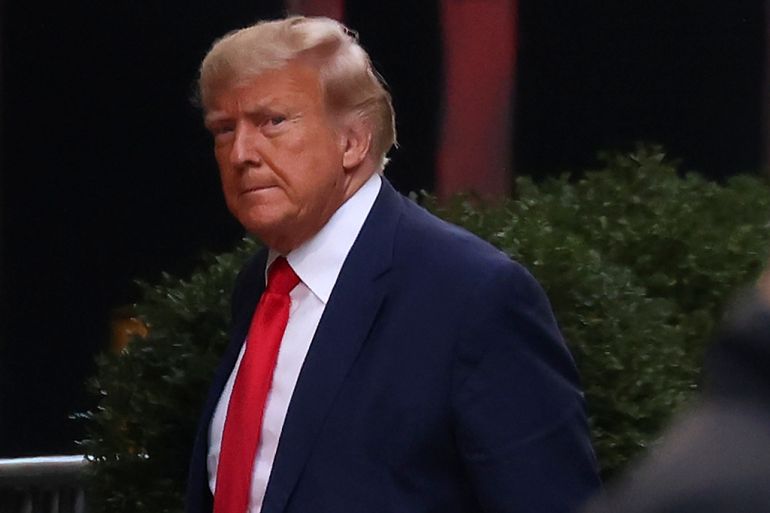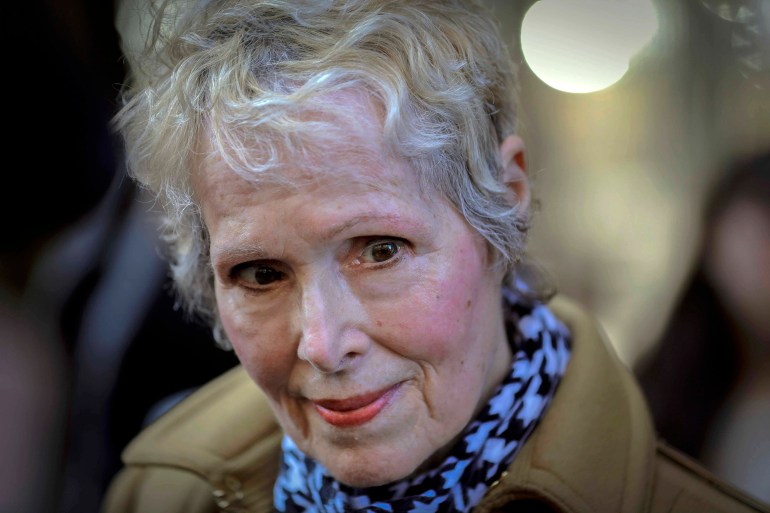US judge rejects Trump lawyer’s mistrial request in rape case
Trump lawyer accused judge of bias as US writer E Jean Carroll’s civil lawsuit continues into second week in New York.

The United States judge overseeing the rape case against Donald Trump has denied a request for a mistrial, after a lawyer for the former president accused Judge Lewis Kaplan of ruling in a biased manner against Trump.
In an 18-page letter filed early on Monday in Manhattan federal court, lawyer Joe Tacopina accused Kaplan of being biased against Trump, including in the jury’s presence, during the civil proceedings that began last week.
Keep reading
list of 3 itemsWhat to know about E Jean Carroll civil rape trial against Trump
New York judge: Defamation trial against Trump to start next week
Tacopina said the effect of Kaplan’s rulings “manifests a deeper leaning towards one party over another”, including in comments where the judge “openly expresses favoritism”.
The judge denied the motion for a mistrial before testimony resumed on Monday. He did not explain his decision, ABC News reported.
Mistrial requests are rarely granted, but they can serve as the basis for eventual appeals. Tacopina was also more likely hoping the judge would grant a version of his alternative requests, The Associated Press news agency reported.
In those, Tacopina asked that Kaplan correct the record for any rulings that mischaracterised the evidence or permit Tacopina more latitude in questioning E Jean Carroll, a columnist who has accused Trump of rape.
Carroll sued Trump in November under a New York state law letting sexual assault victims temporarily sue others for attacks that happened even decades ago.
Lawyers for Carroll, 79, did not immediately respond to requests for comment on Monday from the Reuters news agency on the Trump defence team’s request.
Meanwhile, the proceedings resumed on Monday with Tacopina launching into a second day of cross-examination of Carroll, a former Elle magazine columnist.
Carroll has testified that Trump raped her in the dressing room of a Bergdorf Goodman department store in midtown Manhattan, most likely in the spring of 1996.
She said a chance encounter brought the pair together in an episode that was fun and flirtatious until Trump became violent in the dressing room.
Trump, 76, has long denied the alleged rape, that he was at the store with Carroll or that he even knew her beyond fleeting moments when pictures were taken of them in group settings in other years.
Amid a flurry of public denials and insults from Trump that prompted Carroll to add a defamation claim to the lawsuit, Trump has also insisted that Carroll was motivated by political reasons and a desire to sell copies of the 2019 memoir in which she first publicly revealed her rape claims while Trump was still president.

Carroll has testified that she would have kept her accusation secret forever if not for the #MeToo movement, which gained prominence in 2017.
On Monday, Trump’s lawyer, Tacopina, confronted Carroll with instances in which she advised those reading her column to contact police or call a sex crimes hotline if they were attacked.
Carroll told the jury that she was born in 1943 and was a “member of the silent generation” that was taught “to keep our chins up and to not complain”.
She said she had only called police once in her life, when she feared the mailbox at a home where she was staying was going to be damaged on Halloween.
“The fact that I never went to the police is not surprising for somebody my age,” she said. “We were not trained to call the police, ever.”
Trump, who is seeking the presidency again in 2024 and is currently the Republican frontrunner, has not attended the trial. On Monday, he was in Scotland for a short trip to visit his golf courses there.
Because the case is civil, Carroll must establish her claims by a preponderance of the evidence – meaning more likely than not – and need not meet the tougher criminal standard of proof beyond a reasonable doubt.
The proceedings are expected to last through the week.